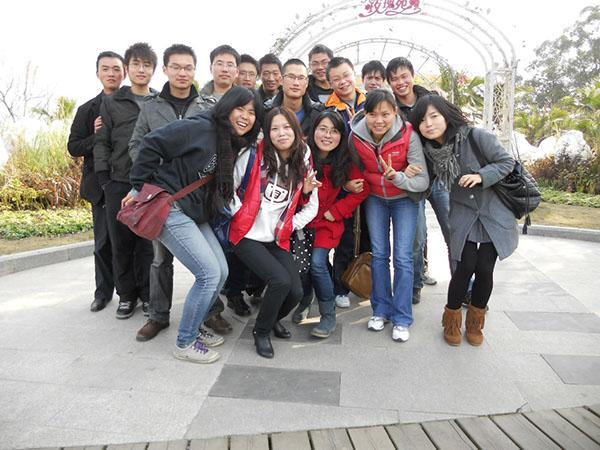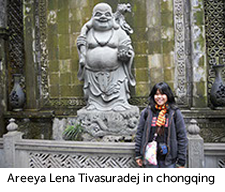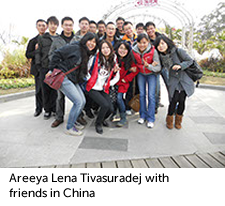by Areeya Lena Tivasuradej, China Council Scholarship Recipient
Chengdu is indeed a layback city as they claim. One thing that grasped my heart was the abundance of tea houses or tea gardens. Walking through a tea house, you can hear the locals chatting loudly in thick Sichuan dialect interrupted occasionally by the sound of crashing mahjong tiles and the cracking sound of peanuts. Once in a while, you will hear a high pitch jingle sound from the "ear cleaners." This autumn was often warm and sunny, something that was odd in the cloudy Chengdu, but the humidity hit the hardest as winter crawled. The lack of sunlight mixed with a little bit of air pollution made everyday feel too cold for a Southern Californian who felt homesick every time the sun peaked out. I spent the first two months strolling around the city silently with my poor Chinese to get familiar with my new home. Chengdu is not big but it is nevertheless full of places to be explored. The famous attractions, to name a few, are the panda reserve, Dufu Cottage, Sichuan Museum, and Qing Yang Temple. The periphery of Chengdu is definitely not to be ignored with the prestigious Emei Mountain and the Giant Buddha at Le Shan Mountain. Two hours and a half of high speed railway also took me to Chengdu's hilly competitor, Chongqing. When asked the locals from the two cities, the comparisons reminded me of the Los Angeles versus San Francisco debate.
The most welcoming feeling I received was from my supervisor and his graduate students. It was difficult for me the first couple of months to communicate with them because I basically knew zero Chinese, but they tried to dig out every English word they remembered and occasionally used their cell phones for accurate translation. In the meantime, I spent the weekdays in Chinese language classes and once a week to practice tai ji and Chinese calligraphy. Chinese culture is very different from American. I learned from my own mistakes and from both international and Chinese students' anecdotes. Funny thing is the birthday boy/girl has to buy his/her friends dinner not the friends. I made more Chinese friends as my Chinese progress. Aside from learning, I also taught English twice a week to college freshmen and sophomores and volunteered with a local environmentaloriented NGO.
Next semester, I will be teaching a class on geographical information system to entering graduate students. Of course, it will be in English. By the end of the scholarship, I hope to take the Chinese language standardized test (HSK). The scholarship undeniably gave me a once in a lifetime opportunity to study in China. The opportunity I always dreamt about but never thought it would come true. Thank you, Dr. Sun, Dr. Su, and everyone at CSUN China Institute for giving me this opportunity.



